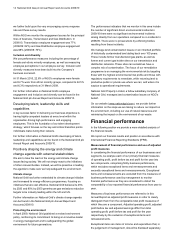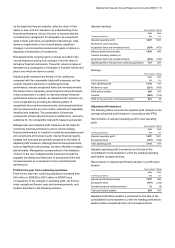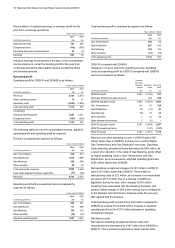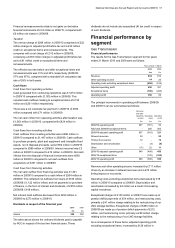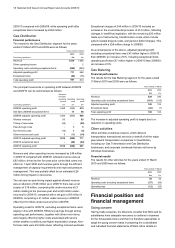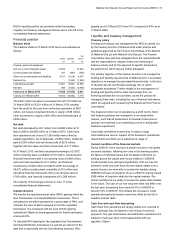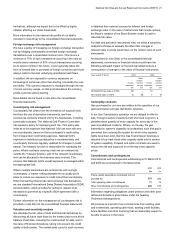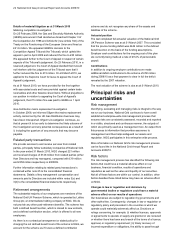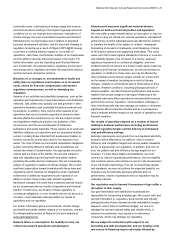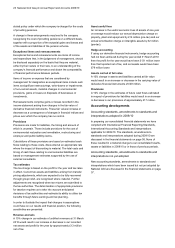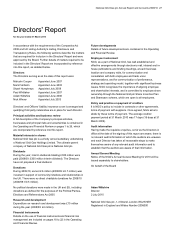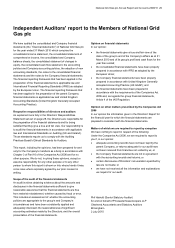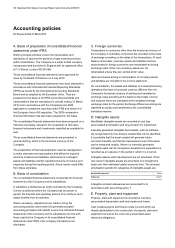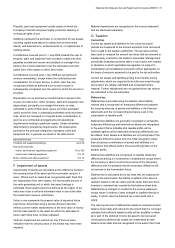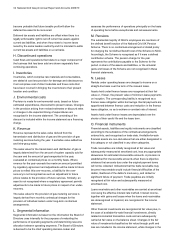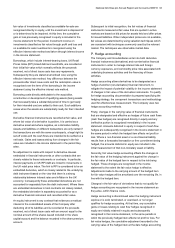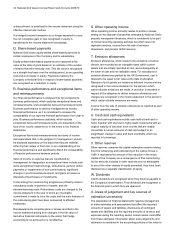National Grid 2010 Annual Report Download - page 26
Download and view the complete annual report
Please find page 26 of the 2010 National Grid annual report below. You can navigate through the pages in the report by either clicking on the pages listed below, or by using the keyword search tool below to find specific information within the annual report.24 National Grid Gas plc Annual Report and Accounts 2009/10
changes to credit ratings and by prolonged periods of
market volatility or illiquidity.
We are subject to certain covenants and restrictions in relation
to our listed debt securities and our bank lending facilities. In
addition, restrictions imposed by regulators may also limit the
manner in which we service the financial requirements of our
business.
Our business is financed through cash generated from ongoing
operations and the capital markets, particularly the long-term
debt capital markets. The maturity and repayment profile of
debt we use to finance investments often does not correlate to
cash flows from our assets. As a result we access commercial
paper and money markets and longer-term bank and capital
markets as sources of finance. Some of the debt we issue is
rated by credit rating agencies and changes to these ratings
may affect both our borrowing capacity and the cost of those
borrowings. As evidenced during recent periods, financial
markets can be subject to periods of volatility and shortages of
liquidity and if we were unable to access the capital markets or
other sources of finance at competitive rates for a prolonged
period, our cost of financing may increase, the uncommitted
and discretionary elements of our proposed capital investment
programme may need to be reconsidered and the manner in
which we implement our strategy may need to reassessed. The
occurrence of any such events could have a material adverse
impact on our business, results of operations and prospects.
Our results of operations could be affected by deflation or
inflation.
Our income under our price controls is linked to the retail price
index. Therefore if the UK economy suffers from a prolonged
period of deflation, our revenues may decrease, which may not
be offset by reductions in operating costs. Conversely during a
period of inflation our operating costs may increase without a
corresponding increase in the retail price index and therefore
without a corresponding increase in revenues. Such increased
costs may materially adversely affect our results of operations.
In addition, even where increased costs are recoverable under
our price controls there may be a delay in our ability to recover
our increased costs.
Future funding requirements of our pension schemes
could materially adversely affect our results of operations.
Substantially all of our employees are members of a defined
benefit pension scheme where the scheme assets are held
independently of our own financial resources. Estimates of the
amount and timing of future funding for this scheme are based
on various actuarial assumptions and other factors including,
among other things, the actual and projected market
performance of the scheme assets, future long-term bond
yields, average life expectancies and relevant legal
requirements. The impact of these assumptions and other
factors may require us to make additional contributions to these
pension schemes which, to the extent they are not recoverable
under our price controls, could materially adversely affect our
results of operations and financial condition.
New or revised accounting standards, rules and
interpretations could have an adverse effect on our
reported financial results. Changes in law and accounting
standards could increase our effective rate of tax.
The accounting treatment under International Financial
Reporting Standards (IFRS), as adopted by the European
Union, of, among other things, replacement expenditure, rate
regulated entities, pension and post-retirement benefits,
derivative financial instruments and commodity contracts,
significantly affect the way we report our financial position and
results of operations. New or revised standards and
interpretations may be issued which could have a significant
impact on the financial results and financial position that we
report. The effective rate of tax we pay may be influenced by a
number of factors including changes in law and accounting
standards, the results of which could increase that rate and
therefore have a material adverse and therefore have a material
adverse impact on our results of operations.
Customers and counterparties to our transactions may fail
to perform their obligations, which could harm our results
of operations.
Our operations are exposed to the risk that customers and
counterparties to our transactions that owe us money or
commodities will not perform their obligations, which could
materially adversely affect our financial position. This risk is
most significant where there are concentrations of receivables
from utilities and their affiliates, as well as industrial customers
and other purchasers and may also arise where customers are
unable to pay us as a result of increasing commodity prices or
adverse economic conditions.
The loss of key personnel or the inability to attract, train or
retain qualified personnel could affect our ability to
implement our strategy and have a material adverse effect
on our business, financial condition, results of operations
and prospects.
Our ability to implement our long-term business strategy
depends on the capabilities and performance of our personnel.
Loss of key personnel or an inability to attract, train or retain
appropriately qualified personnel (in particular for technical
positions where availability of appropriately qualified personnel
may be limited) could affect our ability to implement our long-
term business strategy and may have a material adverse effect
on our business, financial condition, results of operations and
prospects.


